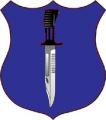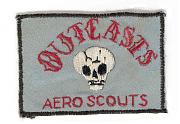
Originally Posted by
Van

Playing the Devil's advocate here, wouldn't it make more sense to suck up Cyber, EW, the NSA, DISA, and the rest of the DoD Comm infrastructure into a Communication Command, after the model of Joint TRANSCOM?
Van, calling your devil's advocate position and raising you another: Why not?
Given all of the problems we've had over the years with communications between the services, perhaps it would also be beneficial to have a single set of communications personnel.
But you do raise a valid question. Looking for redundancies and suggesting mergers can be a slippery slope.
My suggestion is not that this is the right thing to do, merely that it should be analyzed. That analysis would answer questions like:
How many people in each service are performing space & cyberspace functions?
What are the redundant functions across the services and could they be consolidated or merged?
Consider the various commands, organizations and agencies listed below. I'm sure this is not an all inclusive list. All of this was found open source, with the search conducted from a non dot-mil domain. Feel free to add any that I missed. (Thanks in advance; I'll list you in the credits if I ever do a dissertation on this subject.) 
Does anyone else see a lot of overlap?
Air Force Space Command
Deliver space and missile capabilities to America and its warfighting commands.
Taking the above mission statement literally, why would any other service need space commands?
Army Space and Missile Defense Command (SMDC)
SMDC/ARSTRAT conducts space and missile defense operations and provides planning, integration, control and coordination of Army forces and capabilities in support of US Strategic Command missions; serves as the Army specified proponent for space, high altitude, and ground-based midcourse defense; serves as the Army operational integrator for global missile defense; and conducts mission-related research and development in support of Army Title 10 responsibilities.
Navy Space and Naval Warfare Systems Command (SPAWAR)
Deliver FORCEnet by inventing, acquiring, developing, delivering and supporting integrated and interoperable C4ISR, Business IT and Space Capabilities in the interest of national defense.
Naval Network Warfare Command (NETWARCOM)
Deliver integrated cyber mission capabilities in Information Operations, Intelligence, Network Operations and Space that enable warfighters across the full range of military operations. Provide highly trained forces, interoperable and well maintained equipment, and clear processes and governance.
Naval Network Warfare Command (NETWARCOM) - Space
Commander, Naval Network Warfare Command (COMNAVNETWARCOM) has multiple duties as the Naval operational agent for Space: the Navy Functional Component for Space to US Strategic Command (USSTRATCOM); the Navy Space Type Commander (TYCOM) responsible for manning, training and equipping the fleet for space; the Navy Space Cadre Functional Authority responsible for developing, training, and tracking a cadre of Navy personnel with an expertise in space systems; and the Naval Space Campaign lead for US Fleet Forces Command (USFFC). NETWARCOM also supports a Space Watch Cell which maintains and disseminates space situational awareness and produces a space effects package for fleet users.
Naval Network Warfare Command (NETWARCOM) - Information Operations
NETWARCOM is responsible and accountable for coordination and direction on all matters for Information Operations (IO) and Signals Intelligence (SIGINT) to include Electronic Warfare (EW), Psychological Operations (PSYOP), Military Deception (MILDEC), Operations Security (OPSEC), and Computer Network Operations (CNO).
Naval Network Warfare Command (NETWARCOM) - Networks
NETWARCOM provides operational and technical direction of the Navy's Network Operations in support of Joint Forces and Service mission requirements, assesses Fleet Command and Control, Communications, Computers, Combat Systems and Intelligence, (C4I) readiness and system availability and direct follow-on action to resolve capability shortfalls. NETWARCOM coordinates with internal and external sources for delivery of C4I products and reachback services that support globally deployed Naval forces.
Navy Cyber Defense Operations Command (subordinate to NETWARCOM)
To coordinate, monitor, and oversee the defense of Navy computer networks and systems, including telecommunications and to be responsible for accomplishing Computer Network Defense (CND) missions as assigned by Commander, Naval Network Warfare Command and Commander, Joint Task Force - Global Network Operations (JTF-GNO).
U.S. Army Signal Center
The United States Army Signal Center of Excellence provides world class Soldiers and Leaders; trains, educates, and develops adaptive IT professionals; and plans, synchronizes, experiments, and implements Future Network capabilities.
Army 1st Information Operations Command (Land)
1st Information Operations Command (Land) deploys information operations support teams in order to provide IO planning support and vulnerability assessments in support of military forces and provides an IO reach-back capability to operational and tactical IO staffs as directed.
Army Network Warfare Battalion (July 2008)
This battalion formalizes and centralizes the Army's mission to provide rapid, increasing support to forces worldwide and will lead the Army in providing a larger and more robust network warfare capability.
REF:
Army activates network warfare unit
Army Communications-Electronics Research, Development and Engineering Center
To develop and integrate Command, Control, Communications, Computers, Intelligence, Surveillance, and Reconnaissance (C4ISR) technologies that enable information dominance and decisive lethality for the networked Warfighter.
Marine Corps Information Operation Center (MCIOC)
Set to stand-up in 2009 on Marine Corps Base Quantico, the MCIOC mission will be to provide the MAGTF a full spectrum and readily accessible Marine Corps IO resources. [...] The MCIOC will support the MAGTF staff by providing tactically focused, deployable, IO support teams who will assist in IO tactics development as well as formulating requirements including research and development priorities
REF:
Corps to establish the Marine Corps Information Operation Center
Almost forgot the Coast Guard. They have the Coast Guard Telecommunications and Information Systems Command.
Defense Information Systems Agency
The Defense Information Systems Agency is a combat support agency responsible for planning, engineering, acquiring, fielding, and supporting global net-centric solutions to serve the needs of the President, Vice President, the Secretary of Defense, and other DoD Components, under all conditions of peace and war.
Global Cyberspace Integration Center (Air Force)
The Global Cyberspace Integration Center teams with major commands, joint and coalition partners, national agencies, industry and academia to develop, integrate and standardize air, space, and cyberspace components. The GCIC manages Command & Control and cyber innovation, experimentation, and transition efforts including Joint Expeditionary Force Experiment. The GCIC plans, programs, and guides enterprise-level capability-based planning, requirements, architectures, and integration of Air Force warfighting networks, combat support and C2 systems
National Security Agency
The NSA/CSS core missions are to protect U.S. national security systems and to produce foreign signals intelligence information.
The Information Assurance mission confronts the formidable challenge of preventing foreign adversaries from gaining access to sensitive or classified national security information. The Signals Intelligence mission collects, processes, and disseminates intelligence information from foreign signals for intelligence and counterintelligence purposes and to support military operations. This Agency also enables Network Warfare operations to defeat terrorists and their organizations at home and abroad, consistent with U.S. laws and the protection of privacy and civil liberties.
The above list does not include other service specific related areas, such as educational institutions.
Just one example:
Air Force Institute of Technology, Center for Cyberspace Research
Develop Air Force and DoD leaders in cyber operations expert in the use of doctrine, techniques, and technologies that ensure dominance and superiority in cyberspace
Given the items above, could it just be in the realm of the possible that we have too much overlap in this area across all of the services?

















Bookmarks